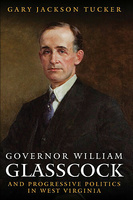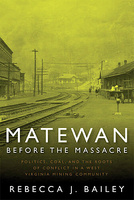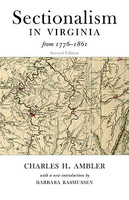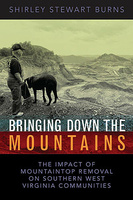GOVERNOR WILLIAM GLASSCOCK AND PROGRESSIVE POLITICS IN WEST VIRGINIA
MATEWAN BEFORE THE MASSACRE
"POLITICS, COAL AND THE ROOTS OF CONFLICT IN A WEST VIRGINIA MINING COMMUNITY"
BRINGING DOWN THE MOUNTAINS
THE IMPACT OF MOUTAINTOP REMOVAL SURFACE COAL MINING ON SOUTHERN WEST VIRGINIA COMMUNITIES
Coal is West Virginia’s bread and butter. For more than a century, West Virginia has answered the energy call of the nation—and the world—by mining and exporting its coal. In 2004, West Virginia’s coal industry provided almost forty thousand jobs directly related to coal, and it contributed $3.5 billion to the state’s gross annual product. And in the same year, West Virginia led the nation in coal exports, shipping over 50 million tons of coal to twenty-three countries. Coal has made millionaires of some and paupers of many. For generations of honest, hard-working West Virginians, coal has put food on tables, built homes, and sent students to college. But coal has also maimed, debilitated, and killed.
Bringing Down the Mountains provides insight into how mountaintop removal has affected the people and the land of southern West Virginia. It examines the mechanization of the mining industry and the power relationships between coal interests, politicians, and the average citizen. Shirley Stewart Burns holds a BS in news-editorial journalism, a master’s degree in social work, and a PhD in history with an Appalachian focus, from West Virginia University. A native of Wyoming County in the southern West Virginia coalfields and the daughter of an underground coal miner, she has a passionate interest in the communities, environment, and histories of the southern West Virginia coalfields. She lives in Charleston, West Virginia.
TRANSNATIONAL WEST VIRGINIA
"ETHNIC COMMUNITIES AND ECONOMIC CHANGE, 1840-1940"
CLASH OF LOYALTIES
A BORDER COUNTY IN THE CIVIL WAR
A border county in a border state, Barbour County, West Virginia felt the full terror and tragedy of the Civil War. The wounds of the Civil War cut most bitterly in the border states, that strip of America from Maryland to Kansas, where conflicting loyalties and traditions ripped apart communities, institutions, and families. Barbour County, in the mountainous Northwest of (West) Virginia, is a telling microcosm of the deep divisions which both caused the war and were caused by it. By examining and interpreting long-ignored documents of the times and the personal accounts of the people who were there, Clash of Loyalties offers a startling new view of America's most bitter hour. Nearly half of the military-age men in the county served in the armed forces, almost perfectly divided between the Union and the Confederacy. After West Virginia split with Virginia to rejoin the Union, Confederate soldiers from the regions could not safely visit their homes on furlough, or even send letters to their families. The county's two leading political figures, Samuel Woods and Spencer Dayton, became leaders of the fight for and against secession, dissolved their close personal friendship, and never spoke to one another again. The two factions launched campaigns of terror and intimidation, leading to the burning of several homes, the kidnapping of a sheriff, the murder of a pacifist minister, and the self-imposed exile of many of the county's influential families. The conflicting loyalties crossed nearly all social and economic lines; even the county's slave owners were evenly divided between Union and Confederate sympathies. With a meticulous examination of census and military records, geneologies, period newspapers, tax rolls, eyewitness accounts, and other relevant documents, Clash of Loyalties presents a compelling account of the passion and violence which tore apart Barbour County and the nation.
The Blackwater Chronicle
West Virginia University English Professor Timothy Sweet edited the second volume in our West Virginia and Appalachia series. The Blackwater Chronicle by Philip Pendleton Kennedy was originally published in 1853, but this wilderness travelogue about the exploration of Canaan Valley has appeal far beyond that time and region. In fact, it was originally published in New York and London, and even in a German edition. This often humorous and always fascinating story, told by Kennedy about the journey he and his colleagues took into yet unexplored territory, will make the reader long for days when there was still wilderness on this continent. It will also be of interest to the outdoorsman and should be viewed as an environmental cautionary tale.




